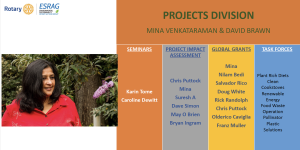By Dr. Mina Venkataraman, ESRAG Projects Director

Dr. Mina Venkataraman explaining the many ESRAG resources you can tap to design environmental projects, track their impact, and apply for Global Grants.
ESRAG’s experts are ready and eager to help you design an effective environmental project and track its impact. You can reach us by emailing your enquiry to projects@esrag.org.
We are rapidly developing resources which you can explore on our website:
- Weekly Projects + Webinars
- Help evaluating project impact, and the iRotree app to document it
- Global Grants planning assistance, and
- Task Forces on specific solutions
ESRAG’s Projects + Webinars draw a worldwide audience every week. The speakers alternate between leading environmental experts every other week and presentations on Club or District projects on the alternating weeks. Coordinators Karin Tome and Caroline DeWitt recruit speakers on a wide array of environmental issues and solutions. You are welcome to nominate your project for a presentation.
Projects + offers a live presentation by Zoom every Wednesday, usually at 2 pm UTC. Participants have the opportunity to discuss the topic live and network with each other. Projects + provides a wonderful ongoing opportunity to connect with people working on a variety of challenges around the world. The recorded talks are posted on ESRAG’s website on the relevant theme page. You’ll find our six themes at the drop down menu under “Our Work” at esrag.org
Project impact reporting involves collecting data on the location, type of project, cost, awareness component, and storyline, as well as granular data of a project. We have a project impact team to advise you, and ESRAG has funded the development of an app, iRotree, to organize these data. Available on our website at esrag.org/iRotree, this app now includes databases for following types of projects:
- tree planting
- mangrove projects
- coral reefs
- grasslands
- pollinator projects
- pollution solutions for air, fresh water, ocean, soil, and plastic
- Public awareness campaigns
- Any other project that is related to the environment
- Global Grant projects inputs
- Adopt-a River
You can use iRotree to measure both the impact and sustainability of your project. This is a great resource in applying for grants. With IRotree we can visually see the difference a project makes as well as record field measurements over time. The app also allows us to calculate the CO2 sequestered in tree projects. To date, 156 Rotary clubs around the world have recorded project data in iRotree, with 98 in India and 32 in the United States.
We invite you to showcase your environmental project by completing this simple online form to give us story leads for the Projects + Seminar and the website. We now have 51 project write-ups on ESRAG’s website, spread over six themes: biodiversity, circular economy, climate, food systems, pollution, and sustainable living.
Technical assistance with Global Grants: ESRAG has a cadre of experts who are experienced with Rotary Global Grants. You can request their help by filling out this form.
 Our Global Grants resource page has links to Rotary Foundation guidelines and a website created by D 5340 to help you find funding partners. Rotary International began accepting applications for environmental Global Grants in July of 2021. To date, 80 grants for a total of US $1.38 million have been awarded, with 60 for projects and 20 for students. The majority of the project grants have focused on biodiversity. ESRAG’s mangroves team, guided by Dr. Chris Puttock, has helped applicants prepare several mangrove project applications, with five approved to date and 36 in the pipeline.
Our Global Grants resource page has links to Rotary Foundation guidelines and a website created by D 5340 to help you find funding partners. Rotary International began accepting applications for environmental Global Grants in July of 2021. To date, 80 grants for a total of US $1.38 million have been awarded, with 60 for projects and 20 for students. The majority of the project grants have focused on biodiversity. ESRAG’s mangroves team, guided by Dr. Chris Puttock, has helped applicants prepare several mangrove project applications, with five approved to date and 36 in the pipeline.
We want to make sure you’re aware of the opportunity to Adopt a River, through Rotary’s partnership with the UN Environment Programme (UNEP). These projects include awareness and clean-ups, followed by restoration of rivers, wetlands, and other freshwater bodies around the world. Clubs and Districts working to keep our main sources of water flowing without invasive and toxic pollutants from headland to see. You can adopt any waterbody! Please register your project on www.restorerivers.org.
Finally, you can get specialized technical assistance by contacting the relevant ESRAG Task Force, whose members offer a wealth of experience and dedication. The current ESRAG Task Forces are:
- Clean Cooking
- Climate Solutions
- Food Waste Solutions
- Plant-Rich Diet
- Pollinators
- Renewable Energy
You can find them all at this link, and click on the Learn More buttons for detail, including project write-ups and manuals.
If you would like to join the task forces or volunteer to help, please do drop us an email.
Contact your regional chapters and do share the ESRAG newsletter with your rotarian friends. Let’s increase our impact!
